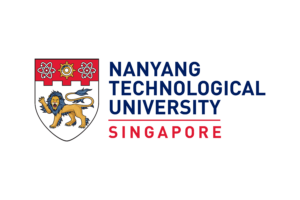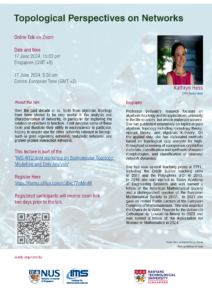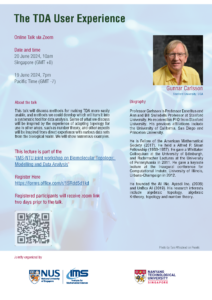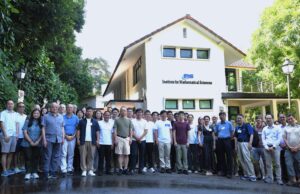Organizing Committee
Co-chairs
- Jelena Grbic (University of Southampton)
- Jie Wu (Beijing Institute of Mathematical Sciences and Applications)
- Kelin Xia (Nanyang Technological University)
Members
- Fei Han (National University of Singapore)
- Fengchun Lei (Dalian University of Technology)
- Zhi Lu (Fudan University)
- Guowei Wei (Michigan State University)
Contact Information
General Enquiries: Ims-enquiry(AT)nus.edu.sg
Scientific Aspects Enquiries: wujie(AT)bimsa.cn and xiakelin(AT)ntu.edu.sg
Overview
A major trend in biological sciences in the 21st century is the transition from phenomenological and descriptive sciences to quantitative and predictive sciences. The availability of the gigantic amount of biological data, which is freely available in various databanks, including GenBank, GEO, PDB, EMDB, etc, provides both unprecedented opportunities and grand challenges for mathematicians. Among them, the understanding of structure-function relationships in biomolecules, such as proteins, DNA, RNA, and their interactions, is the holy grail of structural biology, and has a profound impact to biology, biotechnology, bioengineering and biomedicine. Topology theories and methods, including differential topology, algebraic topology, geometric topology, knot theory, tiling theory, spectral graph theory and topological graph, are essential for deciphering biomolecular structure-function relationships. In particular, the topological data analysis (TDA) and topology based machine learning models have demonstrated their great potential in molecular biology by their great success in D3R Grand Challenges, a worldwide competition series in computer-aided drug design.
The program’s primary aim is to establish the foundation of the new interdisciplinary subject Biomolecular Topology. The goal is to foster new research in biomolecular topology and promote transformative topological techniques by bringing together experts from geometric topology, algebraic topology, combinatorial topology, computational topology, and topological data analysis to tackle fundamental biological challenges. The expectation is that the program will harness existing connections between mathematics and biology and create new ones. The union of multiple topological methods into a framework emphasizing their applicability allows topology to feed constructively into resolving a wide range of fundamental and long standing biomolecular problems. Moreover, the proven effectiveness of topology in different research areas motivates new methods for yet a deeper study of topological applications. This dynamic feedback loop generates compelling and exciting new advances in both mathematics and biological science.
Activities
| Date | Abstract | |
|---|---|---|
| Online talk (via Zoom) by Kathryn Hess Bellwald | 17 June | View |
| Online talk (via Zoom) by Gunnar Carlsson | 20 June (Singapore) or 19 June (Pacific Time) | View |
| Workshop | 24–28 June | View |
Jointly sponsored by Nanyang Technological University




